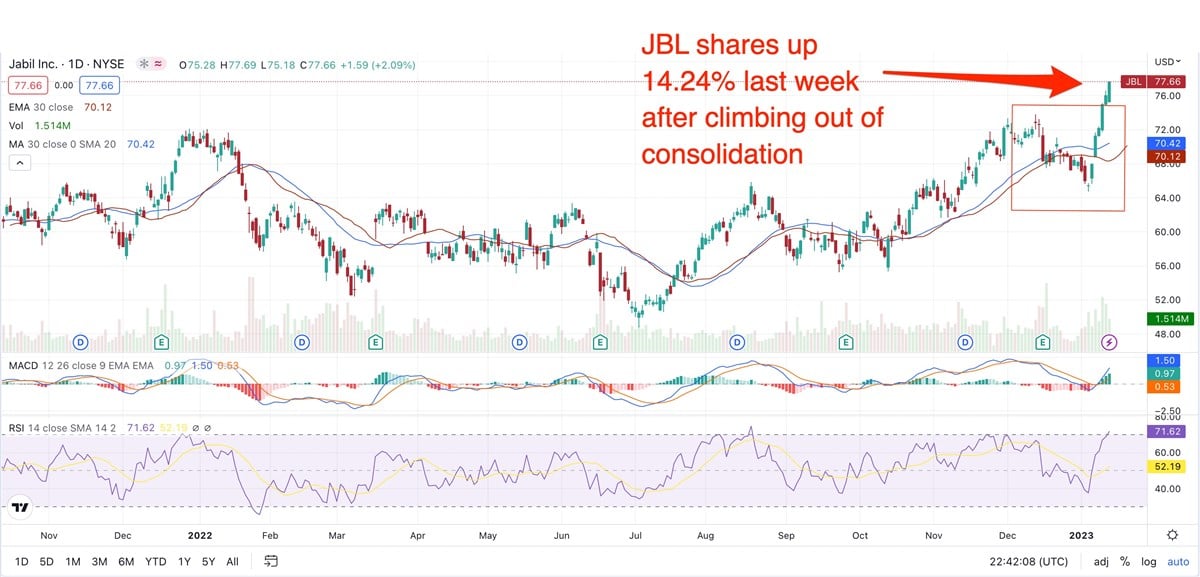Don't Miss These 2 Mid-Cap Techs That Broke Out Last Week Apple component supplier mid-cap Jabil Inc. (NYSE: JBL) is up 14.24% in the past week as the stock broke out of a base that began in early December.
By Kate Stalter
This story originally appeared on MarketBeat


A few years back, the investment theme of Apple Inc. (NASDAQ: AAPL) suppliers was in vogue. While that's not as popular as it once was, Apple component supplier mid-cap Jabil Inc. (NYSE: JBL) is up 14.24% in the past week as the stock broke out of a base that began in early December.
Florida-based Jabil provides contract manufacturing services to electronics companies, including Apple, Cisco Systems Inc. (NASDAQ: CSCO) and NetApp (NASDAQ: NTAP).
Jabil shares surged in their heaviest upside trading volume since December 2020.
The stock began jumping higher on January 6, possibly on news of job cuts in two of the company's California facilities. It said it would permanently lay off 166 employees in Fremont and 39 in Livermore.
As investors saw recently with another tech company, Salesforce Inc. (NASDAQ: CRM), layoffs can be the catalyst for big price moves, as they result in expense cuts. These, in turn, may lead to higher earnings or better operating efficiencies that result in a better return on invested equity.
Last week's trading volume in Jabil was 14.24% heavier than normal, signaling that institutional investors were behind the move.
Institutions Own Most Shares
MarketBeat data on Jabil's institutional investors reveals that institutional investor inflow was slightly higher than outflow in the past 18 months. Institutions control 88.45% of Jabil shares.
That may seem high, but keep a couple of things in mind: First, stocks that are not household names or in glamorous industries typically don't draw much attention from individual investors. Analysts at funds are always looking for stocks that meet the fund's investment criteria. With a market capitalization of $10.35 billion, Jabil is certainly in the sights of funds with a focus on the mid-cap universe.
Second, institutional buyers account for at least 70% of total market activity and sometimes even more. The fact that Jabil is already firmly ensconced as an institutional quality stock means that retail investors are in a good position to follow the pros' moves, which, as investors saw this week, are easy to spot.
Earnings growth has slowed from the red-hot triple-digit pace of 2021 but remains healthy. In the past four quarters, earnings increased between 20% and 63%. Revenue increased between 11% and 22%.
The three-year earnings growth rate stands at 47%, while the revenue growth rate is 10%.
The company expects earnings to come in at $8.40 a share for the fiscal year 2023, up $0.25 from previous guidance. The Wall Street consensus estimate is still $8.38 per share, which would mark a 10% increase over last year.
Earnings data compiled by MarketBeat show that Jabil has a long history of beating bottom-line views.

Contract Manufacturer Flex Also Advancing
Singapore-based industry peer Flex Ltd. (NASDAQ: FLEX) which designs, engineers, and manufactures flexible circuits and circuit boards for customers around the globe, also jumped out of consolidation last week. It finished the week 7.90% higher.
The stock had been finding solid support at its 50-day moving average after retreating from a mid-December high of $23.42. It began climbing out of that consolidation the week ending January 6 and soared beyond that buy point last week, finishing Friday's session at $24.03, near the high of its daily and weekly trading range.
Shares advanced 2.47% Friday following news that Flex would spin off its subsidiary Nextracker with an initial public offering listed on the Nasdaq and valued at around $100 million.
Nextracker provides intelligent, integrated solar trackers and software used in solar power plants worldwide. These products optimize plant performance.
Flex's sales growth dipped in 2020 but accelerated in the past two quarters. Analysts expect earnings to grow 17% to $2.30 per share this year. Next year that's seen growing another 6% to $2.43 a share.
Analysts have a "buy" rating on Flex, according to MarketBeat data. The rating for Jabil is also "buy." Because these are substantially similar stocks in the same industry, with the same market cap, and with revenue and earnings rates that effectively mirror each other, evaluate them carefully before adding them to your portfolio.
There's generally no reason to add two similar stocks; if an industry-specific event or economic outlook causes a decline, you'll have two holdings declining at the same rate at the same time, which is exactly the thought process behind broad sector diversification.











